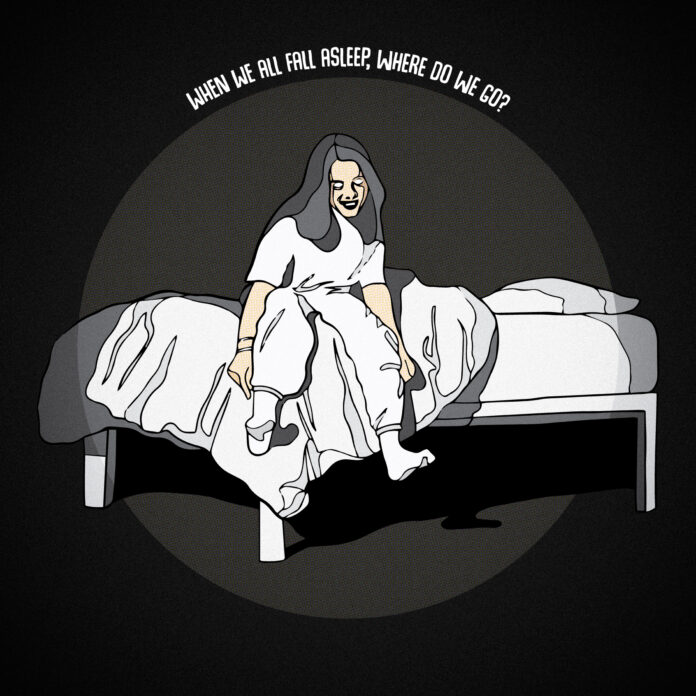Eillish gives us power, innocence in her first album
17-year-old Billie Eillish emerged as a star quickly and suddenly. There seems to have been an abrupt transition between Eillish being a homeschooled teenager in L.A. and skyrocketing to fame. Eillish is not only talented, she stands as an object of fascination — authentic and silly, yet mysterious and intimidating to some. Her hypnotic vocal range, stunning facial features and androgynous fashion sense have made her the alternative pop icon of the current era. Crazy enough, such fame was established with only a nine-song EP. Her first full length album “WHEN WE ALL FALL ASLEEP, WHERE DO WE GO?” becomes all the more significant as the legitimate foundations to an already established, yet adolescent, stage of her fame.
Eillish’s strategy is quite simple: she is true to herself and to her music. Afterall, she is a teenager, and the growing pains are obvious in the album. The album’s collections of songs bounce between hard-hitting creepiness, her humanizing innocence and downright goofing around. To prove the point, the intro “!!!!!!!” is simply an ASMR-esque audio recording of her removing her Invisalign braces. She quickly transitions to the power song “bad guy.” With strong, high-pitched electronic beats and simple lyrical rhymes, Eillish sings from the perspective of a homewrecker, claiming she’s “only good at being bad” and that maybe the girlfriend is scared “because I’m wearing your [her boyfriend’s] cologne.” As teenagers do, “bad guy” shows Eillish playing with and hyping up her power and sexuality, exerting the confidence that comes with age. The dance-worthy popular track acts as the catalyst for the more creepy songs of the album — she flips the sex appeal chased by teenage girls on its head.
“You should see me in a crown,” with a dubstep chorus, kicks off the album’s creep appeal. She continues the power trip established in “bad guy,” yet the form is more tyrannical. With the sound of a sword scraping in the background, her power is brutal and even a little scary. She doesn’t deserve power because she’s a dominant female with sex appeal, but because she simply demands it with hushed low vocals. “Bury a friend,” a clear example of Eillish’s lucid dreaming and night terrors that inspired much of the album, is the album’s top track. Siren sounds and Eillish’s altered voice calls us to “step on the glass, staple your tongue,” creating a grotesque aura that places us in Eillish’s psyche and recurring nightmares.
While “bury a friend” places Eillish on a creative and creepy pedestal, it also ushers in the humanzing aspect of her album. What things live in our nightmares and what scares us in our reality? Eillish delves into topics of love and longing, another ode to her teenage mindset but with an emotional vulnerability that is universal to all ages.
“Wish you were gay” demonstrates the young artist’s impressive vocals while displaying a hope for an explanation as to why someone doesn’t love her back. Her tongue-in-cheek ultimately turns heart wrenching with “when the party’s over.” The same feeling of unequal love is expressed with emotional piano, soft cries and desperate lyrics like “I could lie and say I like it like that.” Eillish is not only a dominant female with an alternative personality, she is also equally as vulnerable as the rest of us. The eclectic nature of “WHEN WE ALL FALL ASLEEP, WHERE DO WE GO?” mirrors Eillish’s adolescence, the intense jumble of emotions she is feeling for the first time that we can relate to in one way or another. Possibly the most exciting aspect of the album is that this level of emotional and musical maturity comes from a 17-year-old — the feelings Eillish makes us feel and the psychological places she takes us too in this album are only the beginning.
Written By: Caroline Rutten — arts@theaggie.org




